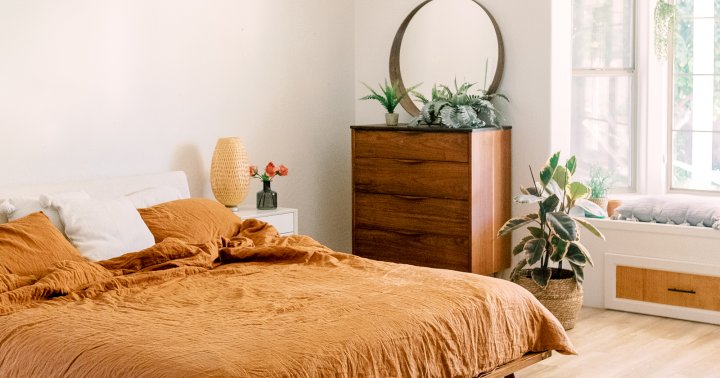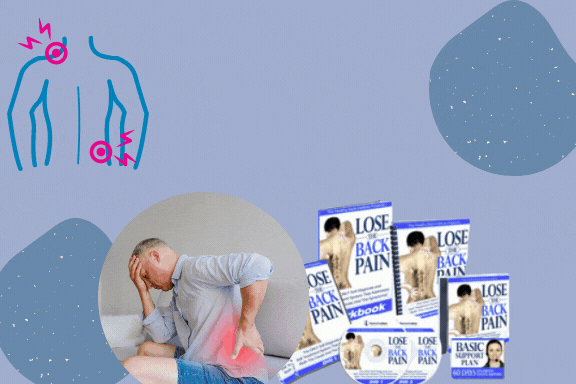Nurses, Don’t Ignore These Signs Your Footwear Needs An Upgrade (+ Our Top Picks)
Plus, signs your shoes need an upgrade.
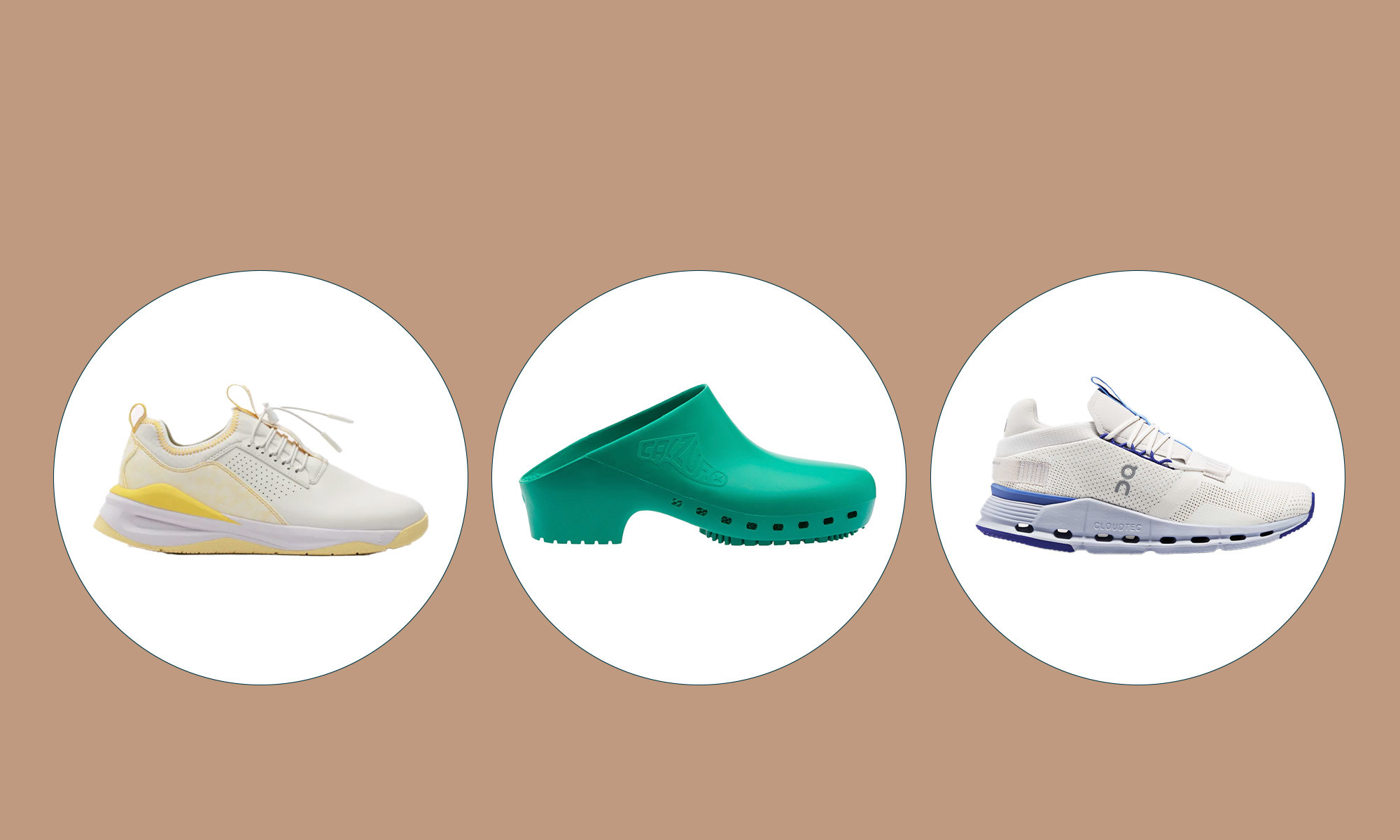

Contributing writer
Contributing writer
Jamey Powell is a writer and editor living in Brooklyn, NY. Previously the senior market editor at Healthline.com, she has years of experience scouring endless product reviews and testing out the latest and greatest products in the sleep, fitness, and nutrition markets.
July 22, 2023 Our editors have independently chosen the products listed on this page. If you purchase something mentioned in this article, we may There’s no debate: Nursing is a seriously physically (and mentally) demanding job. The best shoes for nurses help keep you supported during the extended periods of standing the career entails. Because healthcare workers spend countless hours taking care of others, there’s no time for foot pain to slow them down. These shoes meet podiatrist guidelines and even come highly recommended from real nurse practitioners.
Why is finding the right shoes important for nurses?
“The average person walks anywhere between 1.5 to two miles per day,” says Austin-based podiatrist, Anne Sharkey, DPM. For healthcare workers, who spend most of their days on the move, that number can get much higher.
“With each step, the heel strikes the ground, and weight bearing forces are transmitted through the entire foot. This equates to a lot of stress through the joints in the feet.”
Research backs this, too. One recent review from 2023 found that nurses are at high risk of developing chronic foot pain1 due to the physical demand of the job.
Another 2023 review shows prolonged walking and standing puts nurses at a higher risk of foot and ankle disorders2.
According to Sharkey, it’s critical to wear supportive shoes suited to your individual foot type. “Poor shoe gear can lead to a whole host of pain and problems,” she explains. If not addressed, this pain can start at the foot and move its way up to your knees, hips, and back.
Our picks for the best shoes for nurses of 2023:
Best sustainable: Allbirds Tree Runner
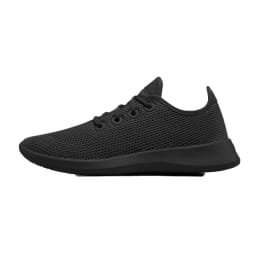
Pros:
Made with sustainable materialsHighly rated for comfortMachine washableCons:
Whole sizes onlyMay be too flexible for someIf eco-friendly initiatives and materials are important to you, check out Allbirds, one of the most sustainable shoe brands around. The Tree Runners include materials such as eucalyptus-derived Tencel, laces derived from recycled water bottles, and foams made from sugarcane and castor bean oil.
These shoes are a hit with nurses for their cushy comfort, breathable upper, and easy machine wash-friendly design.
On the con side, they’re rather flexible, so they might not work for folks who need more support. Plus, they’re only available in whole sizes, so if you’re in between Allbirds advises that you size up.
What nurses say: “I am a nurse and on my feet all day, 10+ hrs. These are the most comfortable sneakers and support is great as well. Highly recommend” - Nurse Lori
Best slip-resistant: Gales Frontline
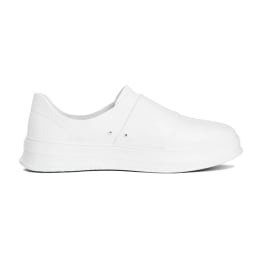
Pros:
Waterproof & easy to cleanSlip-resistant design Available in an extensive size runCons:
Material can feel a bit heavySeveral reviewers say they’re squeakySize run:
5-17Half sizes available
If you’re looking for a shoe that can stand up to spills and stains, these deliver. They’re waterproof, easy to clean, and have slip-resistant soles to keep you grounded.
Plus, these shoes are super lightweight and made with partially recycled materials. While most people say they run true to size, nurses with wide feet may prefer the Gales Pro Line.
While they’re a hit with nurses for their lightweight, waterproof design, one tradeoff is that the shoes can trap heat and moisture if your feet tend to run hot. As a result, some reviewers complain about squeaking.
What nurses say: “I really needed a shoe that was comfortable but was also non-slip and water proof for giving showers and not slipping on the floors I just mopped. So far it has been nothing but a good experience with these shoes. They are cleaned so easily and very easy to put on.” -Nurse Michaela
Advertisement
This ad is displayed using third party content and we do not control its accessibility features.
Best overall: Clove Classic
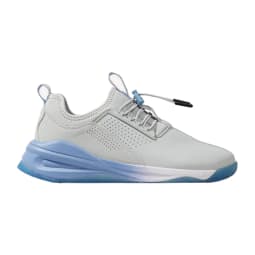
Pros:
Fluid-resistant materialEasy slip-on designLots of color optionsCons:
No wide or narrow sizes availableNot as breathable as Aero modelSize run:
5-12.5Half sizes available
Since its launch in 2018, Clove has been an extremely popular pick with nurses across the country. This Classic shoe was designed with input from healthcare providers who are on their feet all day.
The outer material is fluid-resistant, the shoes are well-cushioned with solid arch support, and the elastic tie system means you never have to worry about loose laces.
Nurses love that these shoes are available in many fun colors, are easy to keep clean (you can wipe them down easily and even throw the insoles in the wash). Plus, every Clove purchase comes with two pens and a branded badge wheel.
What nurses say: “I love my Cloves! They keep me comfortable my entire 12 hour shift. The best part about them is that they are easy to keep clean and wipe off because, let’s be honest, as a nurse many undesirable fluids get on them. ” — Nurse Lindsey
Best lightweight: Clove Aero
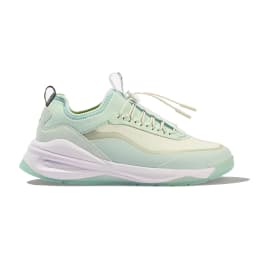
Pros:
Light & breathable materialsStill fluid resistant & easy to cleanEasy slip-on designCons:
Less color options than Classic modelMay run a half size small for someSize run:
5-12.5Half sizes available
Returns:
30 days (customer covers cost of shipping)
While the Clove Classic shoe benefits from being fluid-resistant, the durable and wipeable material can trap heat more easily. If you know you’ll want more breathability, check out Clove’s Aero model.
The Aeros are still fluid-resistant, with micro perforations to encourage a more breathable feel. They’re slightly lighter, but have a good amount of cushion and arch support for long days on your feet.
While these shoes are not available in wide sizes, several reviewers note that if you typically wear wides you’ll be happy going a half size up.
What nurses say: “These are so comfortable and durable! My feet don't get overheated either.” -Nurse Audra
Advertisement
This ad is displayed using third party content and we do not control its accessibility features.
Best for cushion: Hoka Bondi 8
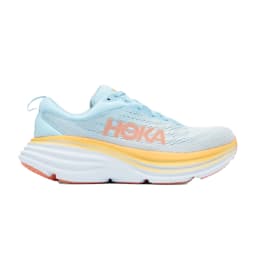
Pros:
Super cushy and breathableAvailable in wideAPMA approvedSize run:
5-12Half sizes available
While they’re originally designed for running, Hokas have become extremely popular among healthcare workers thanks to their cushy, shock-absorbing design.
The Bondi 8 is a lightweight, breathable shoe with neutral support and a memory foam ankle cradle. They’re approved by the American Podiatric Medical Association (APMA) and include recycled polyester throughout the upper.
One consideration: These will be tougher to keep clean than others, as they’re not fluid-resistant or machine washable.
What nurses say: “I wear two pairs of Hoka sneakers. Bondi 8 and Clifton 9. However, the Bondi 8’s have much more support in the heel and ankle, IMO. I usually wear those when I’m working three days in a row.” -Nurse Erin
Best for plantar fasciitis: On Cloudnova
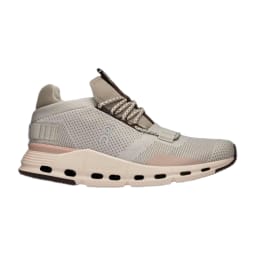
Pros:
Well cushioned heelCustomizable lace system for less tying10% recycled materialsCons:
Not easy to cleanNo wide sizesSize run:
5-11Half sizes available
With a rocker style shape, solid arch support, and generous heel cushion, On’s Cloudnova shoes are a hit with nurses—especially those who are prone to plantar fasciitis.
They’re not available in wide sizes, but many reviewers say the standard size is roomy enough for wide feet, especially in the toes. The Cloudnovas are soft to slide into and use a customizable lacing system that lets you tuck the laces neatly under the tongue so you can prevent the dreaded loose lace during your shift.
One consideration we should note is that these aren’t waterproof (although On does make waterproof shoes!), so they aren’t as easy to keep clean as other pairs on our list.
What nurses say: “I am a nurse and decided to try these out. These saved my feet. I also have plantar fasciitis and these are the only shoes I have found to not cause pain.” - Nurse Ajay
Advertisement
This ad is displayed using third party content and we do not control its accessibility features.
Best for matching your scrubs: FIGS | New Balance XC72
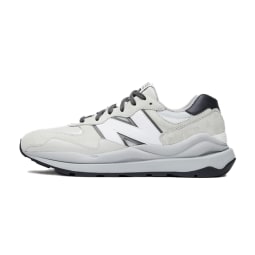
Pros:
Unisex sizingWater repellent finishCons:
Hand wash onlyRuns largeSize run:
5.5-14.5Half sizes available
FIGS, the popular scrubs company, partnered with New Balance to bring a line of shoes designed for healthcare providers. The XC72 collaboration is already one of the more popular models, with a focus on traction, stability, and antimicrobial materials.
There’s a water-repellent finish on the upper materials, and the shoes come with two sets of water-repellent laces. Just note, this pick is not machine washable and the shoes do have suede on the upper—so you’ll want to take care while cleaning.
What nurses say: “Comfortable the minute I put them on and worked a busy 14 hour shift. Kept my feet dry and easy to wipe clean.” - Nurse Priscilla
Best for men: Nike Air Monarch
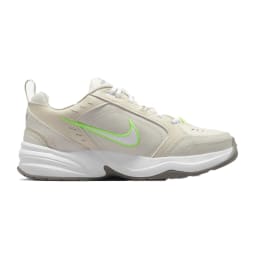
Pros:
Available in regular & extra wideLeather upper for easy cleaningCons:
Not veganNot many color optionsSize run:
6-13Half sizes available
Returns:
Varies by retailer, 60 days for Nike members, 30 days Amazon
Nike’s Air Monarchs are highly rated by nurses for being supportive, durable, and orthotic-friendly. The shoes have a leather upper that makes them more fluid-resistant and easy to wipe clean, with the soft foamy feel you’d expect from a Nike Air shoe.
One big pro of this shoe is that they’re available in extra wide sizes, so they’re roomy enough for folks with wide feet or anyone who uses custom orthotics.
What nurses say: “I’ll wear any Nikes, but especially Nike Monarchs! V comfy.” - Nurse Danny
Advertisement
This ad is displayed using third party content and we do not control its accessibility features.
Best clogs: Calzuro Classic
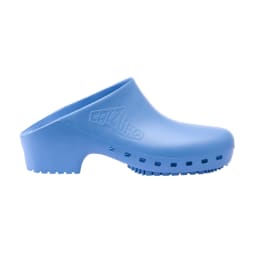
Pros:
Plenty of color choicesOptional heel strap and comfort insoleSuper easy to cleanReturns:
30 days(customer pays shipping)
For a classic clog-style shoe, try this slip-resistant pair from Calzuro. These shoes are autoclavable (which means you can steam sterilize them), machine washable, and dishwasher-friendly.
While we didn’t see many complaints about breathability, they’re also available in a perforated design for added ventilation.
Calzuro offers the option to add a comfort insole and heel straps to keep your feet more secure. Some folks do mention the shoes running small, so take a good look at their unique size chart before ordering.
What nurses say: “I work long hours in the operating room. I’ve worn them for a week now and they are super supportive. The heel isn’t high like I thought it would be- it’s actually the perfect slope and helps with standing long hours. No back pain after a full 10 hours standing!” - Nurse Lydia
Comparing the best shoes for nurses:
How we picked:
Nurse recommended
We crowdsourced nurses for these picks by reading hundreds of reviews and interviewing the author’s personal connections.
Versatile style
Nursing shoes need to be sturdy, but we know style is also important. Whether you love a clog or a lace up sneaker, we found a suitable shoe for your next long shift.
Easy to clean
Nurses often have a messy job—that’s why we tried to keep wipe-friendly and wash-friendly materials at the top of our priority list when making these picks.
Expert criteria
We kept in mind the recommendations of our expert, Anne Sharkey, DPM, and included shoes with cushion and support, as well as picks for those with wide feet.
How to choose the best shoes for nurses:
Sharkey says that, in general, a shoe should fit well, have good arch support, and have generous shock absorption and cushioning. Consider the below factors when picking which shoes are right for you.
Fit: Per Sharkey, it’s important to make sure your shoes are the appropriate size, both in terms of length and width.
“Shoes should be purchased after trying them on at the end of the day (when your feet are most swollen) to ensure that they won’t be too tight if swelling is to occur,” she advises.
Support: “A shoe for activity should not be able to be taken and bent or twisted in half—this is a sign the shoe is too flexible and won’t provide adequate support for long hours of activity,” Sharkey says.
“There should be good support at the heel counter (the back of the shoe that cups the heel). A good way to test this is to attempt to squeeze it between your thumb and pointer finger. There should be little give with this test.”
Additionally, knowing your foot type is key for finding the right pair. “Those with flat feet are going to want to look for a stability shoe or a motion control shoe, while those with high arches will be best suited with neutral shoes,” Sharkey explains.
Shock absorption & cushioning: “Because hospital and clinic settings often have nurses working on hardwood, tile, or concrete surfaces, shock absorption and cushioning is so important,” Sharkey adds.
“The better the cushioning technology in the shoe, the less shock that is transmitted up the kinetic chain through joints of the lower extremity. Less shock equlas less pain, aching and fatigue!”
Signs you're not wearing the right shoes
“Foot pain, knee pain, hip pain and back pain can be signs of inadequate shoe gear,” Sharkey says. “Foot and leg aching, as well as fatigue are also signs of poor shoe gear.”
When in doubt, it may be helpful to see your podiatrist. If you’re experiencing continued foot pain, you may benefit from custom orthotics.
FAQ:
Why do nurses wear sneakers?
Nurses often opt for sneakers because they offer a good balance of cushion and support for standing and walking during long shifts. However, you may also see nurses in clogs or loafers. At the end of the day, it’s a matter of personal preference.
What are the free shoes for healthcare workers in 2023?
Crocs runs an annual program that allows you to nominate a healthcare worker for free shoes. However, the window for this program is closed this year. They do, however, offer a 15% off discount for healthcare workers.
How often do nurses buy shoes?
The cadence depends on the shoe and its materials—but, as a general rule, podiatrists say nurses who cover a lot of ground should replace their shoes every six months.
What color shoes can nurses wear?
When it comes to color, there isn’t one set dress code for nurses. Historically, nurses wore white shoes—but these days, you’ll see all sorts of colorful kicks roaming around a hospital. Check with your HR department to see if there are any guidelines around shoe color at work.
The takeaway
Because nursing is a job that keeps you on your toes—literally—it’s important to find a pair of shoes that keep your feet feeling supported and cushioned. Luckily, there’s no shortage of supportive shoes in a variety of styles for nurses to choose from.
Foot pain is a drag, but it can also lead to larger issues up the kinetic chain, such as knee and back pain. If you’re still experiencing pain on the job after trying a new pair of shoes, you might want to chat with a podiatrist about custom orthotics.

 Tfoso
Tfoso 











